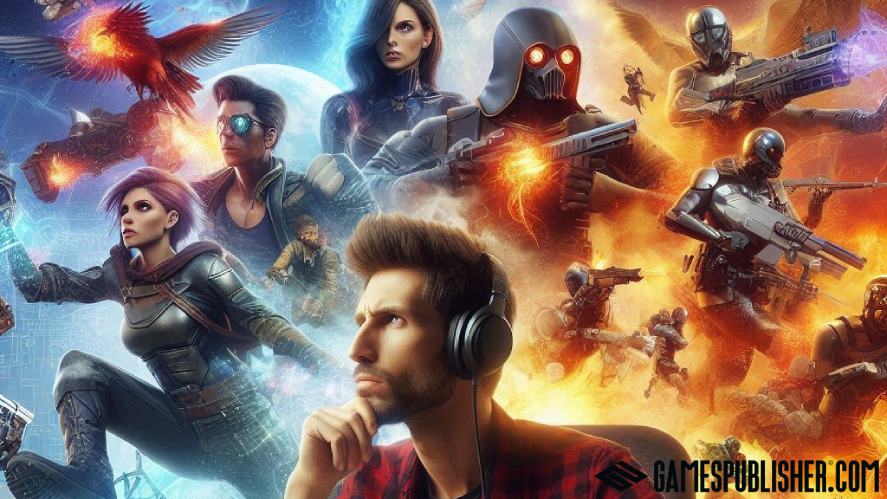Welcome to Gamespublisher.com, the best place for game developers and publishers to gain comprehensive how-to resources.
In this article, let’s talk about Intelligent NPCs (non-playable characters), which significantly improve the quality of the video game industry.
The first effect NPCs bring to the game is to help enhance game immersion. Additionally, they strengthen player engagement by providing exciting and meaningful interactions.
These NPCs also enhance gameplay depth, provide strategic challenges, and create dynamic scenarios, making games more engaging.
Understanding Intelligent NPCs
Intelligent non-player characters (NPCs) are computer-controlled characters in video games. They have behaviors and decision-making processes that simulate human intelligence.
In video games, NPCs typically interact with players, the game environment, and other NPCs. Thus, complex technology often uses them to enhance the gaming experience.
This is their roles in different types of games:
- Role-Playing Games: NPCs are quest-givers and companions with gamers. They also play a role in driving the story, providing resources, and assisting in combat.
- First-Person Shooters: Serve as allies or enemies, NPCs supporting the player or providing combat challenges.
- Strategy Games: In these games, they will be an advisor offering guidance or opponents posing strategic challenges.
- Simulation Games: NPCs simulate daily activities as citizens and manage tasks and resources as workers.
- Adventure Games: Some characters will offer clues, story elements, and puzzles for player progression.
Non-player characters have evolved from basic scripted actions to more complex behaviors today.
Initially, NPCs had simple movements and responses. Over time, they gained scripted routines and started showing more lifelike behaviors in open-world games.
Moreover, modern NPCs use advanced artificial intelligence to react realistically to players and make decisions, enhancing immersion in game worlds.
Technological Foundations
Artificial Intelligence (AI) and machine learning are crucial for creating intelligent non-player characters in video games.
These technologies analyze a significant amount of data from gameplay. Therefore, developers use this data to improve NPCs over time.

For example, NPCs can have different personalities. They can learn from what they do right and wrong or change their plans based on what happens.
Additionally, NPCs act in ways that make sense based on the player’s actions, making the game more exciting and engaging.
The Behavior Tree
Behavior trees are used a lot in making games. They are like step-by-step plans that help NPCs decide what to do.
It is easy to understand that these trees are organized like flowcharts, breaking down complicated behaviors into smaller parts.
Game developers use behavior trees to control how NPCs act in situations like fighting, exploring, or talking to others.
Inside these trees are tools for decision-making. You will help NPCs understand what’s around them, determine their goals, and choose fitting actions.
This ensures NPCs act in ways that make sense for the game’s story and rules, making the game more immersive for players.
Natural Language Processing
Natural Language Processing (NLP) is essential for NPC conversations in the gaming industry.
The algorithms examine the words and structure of what players say. After that, they determine what the player means and create suitable responses.
They can also take part in story-based interactions. This makes gameplay better because players can talk naturally with NPCs.
As NLP improves, NPC conversations will become even more lifelike.
Designing Intelligent NPCs
Creating intelligent NPCs in video games involves a blend of character development, technical implementation, and gameplay balance.
These aspects are crucial, as they ensure that NPCs enhance the game’s narrative and immersion.
Character Development
Believable and engaging NPCs require careful character development.

Here are some valuable tips to help video game publishers achieve this goal more effectively:
- Backstory: Give each NPC a backstory, even if it’s simple. This helps make their actions and dialogues more consistent and meaningful.
- Personality Traits: Define distinct personality traits for your NPCs to add depth and variety to interactions. Are they brave, cautious, humorous, or serious?
- Motivations: To make their behavior more realistic and relatable, understand what drives your NPCs. What are their goals, fears, and desires?
- Appearance and Voice: Ensure the NPCs’ visual design and voice acting match their personalities and roles.
- Behavior Patterns: Design predictable yet varied behavior patterns. NPCs should have routines and the ability to react to unexpected events.
By following these tips, you can create authentic and engaging NPCs. Players will enjoy interacting with characters that have depth and personality.
Scripting vs. AI-Driven NPCs
In video game development, non-player characters can be controlled through two primary methods: scripting and AI-driven systems.
Both approaches have their own unique benefits and drawbacks, influencing how NPCs react and engage within the game world.
Scripting
As for the scriptwriting method, there are a few advantages and disadvantages.
Scripting allows precise control over NPC actions and ensures they behave strictly as intended in specific scenarios. It’s easier to debug and predict.
However, scripting often results in rigid and predictable interactions, which can become repetitive and lack dynamism because they follow a predetermined pattern.
It also requires extensive manual coding for each possible action and reaction.
AI-Driven
The AI-driven method also comes with distinct advantages and disadvantages.
AI-driven NPCs can use algorithms to decide actions based on player interactions. This creates more dynamic, unpredictable, and realistic behaviors.
However, AI NPC games systems can be complex and behave unexpectedly, which may need constant fine-tuning.
That said, AI-driven NPCs use algorithms for dynamic behaviors but require complex implementation and ongoing fine-tuning for unexpected actions.
Balancing Intelligence and Fun
To ensure NPCs in games are intelligent without overshadowing player experience, clearly define each NPC’s role.
Supportive characters should assist players without solving challenges, while antagonistic ones should provide a reasonable challenge without being too powerful.
Additionally, implement adjustable AI difficulty settings. This allows players to choose how challenging they want NPC interactions to be.

Above all, NPCs should enhance player agency. Their actions should complement player decisions rather than dominating or weakening them.
Moreover, player feedback can be used to adjust NPC behaviors. This helps determine whether NPCs are too helpful, too challenging, or not engaging enough.
Lastly, balance realism with fun. While realism can deepen immersion, it shouldn’t sacrifice enjoyment.
Challenges in Developing Intelligent NPCs
Developing intelligent NPCs in video games presents various technical and design challenges.
Technical Challenges
Implementing AI-controlled NPCs will pose some challenges for game developers. Typically, it requires significant computational resources.
Complex decision-making and behavior prediction algorithms can strain CPU and GPU capabilities, impacting overall game performance.
Additionally, real-time decision-making algorithms must balance complexity with efficiency to ensure NPCs react promptly without causing delays in gameplay.
Finally, creating AI that can handle a variety of scenarios and player interactions remains a significant hurdle for developers.
Design Challenges
Designing NPCs in games involves several challenges.
The first is to keep the game balanced. NPCs need to challenge players without being too hard or too easy.
Ensuring AI behaviors are fair and fun for all skill levels may be challenging.
Second, ensure NPCs have diverse behaviors. NPCs should act to match their personalities, roles, and the story.
Developers may use behavior trees and decision-making algorithms to create randomness and adaptability.
Third, avoid predictable NPC actions. Predictable behavior can make the game less immersive and less replayable.
Remember to change actions, reactions, and dialogue choices to make interactions feel dynamic and lifelike.
Case Studies and Examples
In game development, some games are well-known for their smart NPCs. These games show the potential of advanced AI in enhancing gameplay.
The Last of Us is one such game that stands out for its NPCs with highly sophisticated behaviors and interactions.
These non-playable characters react realistically to the player’s actions and dynamically adapt to the changing circumstances within the game world, enhancing the overall sense of realism and immersion for players.
Similarly, in Red Dead Redemption 2, the game intricately adjusts to the player’s actions and decisions, offering a multitude of dynamic responses based on their presence.

Besides that, insights from developers show key lessons in creating intelligent NPCs.
As for the importance of balancing complexity and performance, advanced AI can make the game realistic, but it needs to be optimized to avoid overwhelming the system.
The second one is to improve NPC behaviors.
Developers also highlight the importance of testing and player feedback. In that way, NPC actions remain interesting and realistic without becoming too predictable.
Another important lesson is the need for clear role definitions for NPCs. Consistent NPC behaviors will help keep players immersed in the game world.
By learning from these successful implementations, developers can create more advanced and engaging NPCs in future games.
Future of Intelligent NPCs
As AI technology advances, the future of intelligent non-player characters will have more development potential.
Natural language processing (NLP) with machine learning and deep learning enables NPCs to talk more naturally or to change their behavior based on what players do, creating a dynamic game world.
AI also helps create unique stories and quests for each player, making every game different.
Thus, NPCs can interact with the game world more intelligently, using objects and adapting to changes in real time.
In the future, they will navigate complex environments smoothly and make strategic decisions, planning several moves and collaborating with other NPCs.
This also means that gamers will raise their expectations for the game. Players need NPCs to be more realistic, have unique personalities, and contribute meaningfully to the storyline.

These evolving expectations drive developers to use advanced technology to create more sophisticated NPCs.
As a result, NPC design needs to continuously improve to meet the demands of players, ensuring a more immersive and engaging gaming experience.
Besides, creating highly intelligent NPCs raises critical ethical concerns.
Issues like privacy arise because they can access a lot of data, and there’s concern they might be used unfairly to influence people.
Additionally, oversight is crucial to ensure these NPCs are developed and used ethically.
So, balancing technological progress with ethics is vital to getting the most out of NPCs while reducing risks to the game.
Conclusion
In summary, intelligent NPCs play a crucial role in game development by transforming how players interact and enjoy games.
Similarly, developers can create NPCs that provide immersive and dynamic gameplay experiences using advanced technology and thoughtful design.
Moreover, developers should innovate and explore NPC intelligence to push the boundaries of gaming, offering players richer and more engaging adventures.
This continuous improvement aims to captivate players with exciting new challenges and experiences.
Loading survey...

